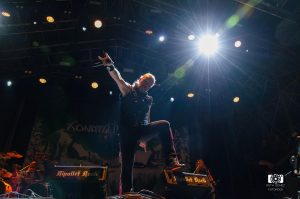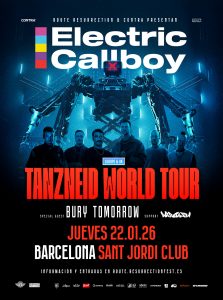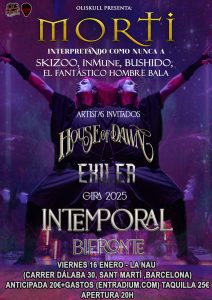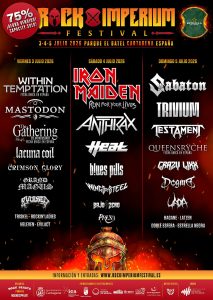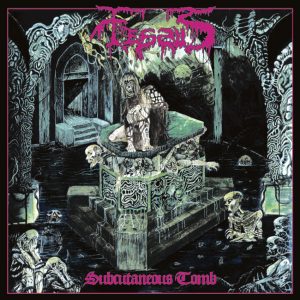TIME RIFT: Echoes of Defiance: Music, Myth, and the Fight for Inclusion

Raw riffs, mythic lyrics, and unapologetic voices—this is more than an interview; it’s a window into the soul of Time Rift. Emerging stronger from adversity, this Portland-based band channels personal struggles, ecological reverence, and a fiery defiance into their upcoming album, In Flight.
From the struggles of breaking barriers in a male-dominated genre to infusing music with the healing power of nature, the band dives deep into topics that challenge the norms of rock and metal. Frontwoman Domino Monet speaks of representation and vulnerability, drummer Terrica Catwood shares a lifetime of smashing through gatekeeping, and Justin Kaye reflects on connecting riffs to the Western Red Cedar.
It’s rock ‘n’ roll at its most human: raw, real, and deeply connected.
Read on to discover how Time Rift turns rebellion into inclusion, introspection into universal anthems, and raw energy into timeless soundscapes.
-Hi, first off thanks for taking your time. How’s everything doing in the lair of Time Rift?
JK – Hi Tania and Queens of Steel! Thank you for having us. We’re all fans of QoS and appreciate your interest in Time Rift. Things are as good as they can be for us. We have been waiting for the release of our new album, IN FLIGHT, and that day is coming soon! The 17th of January can’t come soon enough.
– Time Rift emerged from the ashes of Doomsower with a new sound and energy. How did that transition reshape your understanding of what you wanted to say as artists, and how has your purpose evolved further with In Flight?
JK – You did your research on the metal archives…ha! That was a band I had with old mates from about 2008 to 2014. Those were years I cut my teeth playing music. Learning what works on stage, what doesn’t, how to act as a musician at a show and not just as a fan. All very pivotal and I wouldn’t be who I am if I didn’t learn from past lessons.
So a little history of Time Rift to give context:
That band was put to rest and then Time Rift started by myself and two others. Many years spent just wading in water, so to speak. Never had any goals beyond playing a show or two and having a good time. Which we did. But you can only play tepid local shows so much.
Terrica then joined on drums in 2017 and we recorded our debut album ETERNAL ROCK at the very end of 2018 / beginning of 2019. We didn’t want to be another group who puts their music online for nobody to hear. The aspirations were building and in 2020, of all years, Dying Victims Production approached us for an album deal. ETERNAL ROCK came out and post-covid, we had some really great shows and made great connections with different bands and people.
Fast forward to 2023 and we began finalizing IN FLIGHT.
I didn’t want a generic heavy metal or rock album. One about girls, booze, cars, or directly about politics. Terrica and I set out to basically make a “heathen” / “pagan” / “nature” rock album. Production began and then our singer/bassist Levi quit.
I could only think of one person to join the band as singer and that was Domino Monet.
We were already friends but bringing in Monet and discussing concepts and ideas really worked. We clicked instantly. So to finish my point and answer the question – years of playing without a true purpose has brought me to think and do the opposite!
DM: Funny how that works, haha! I was so fortunate to be asked to join this band, and as Justin hinted at, I joined at a point where the conceptual groundwork had already been laid out- so my artistic intent with In Flight was to honor the vision the band had already been conjuring while also staying true to the authenticity of my voice and lyrical processes, especially since that differed a bit from previous albums. Being in a band is always, at its best, a collaborative process, so In Flight to me represents how far we’ve come as a collective creative machine. When the album can stand on its own, essentially become its own entity, that’s when I know we’ve created something really special.
– Your music often carries a raw, defiant energy. Are there personal struggles or inner conflicts that inspired the lyrical or instrumental intensity on this upcoming album? How do you translate those feelings into the recording process?
DM: Thank you so much for this question. This is how I like to think about it: If the goal is to create music that harnesses a sense of timelessness, then the lyrical content has to make the personal universal. So yes, there are certainly internal conflicts and personal struggles that inspire the lyrics but that’s just the starting point. It has to move beyond my individual experience and become more mythopoetic in proportion in order to really get to the heart of the human condition. Terry Tempest Williams has this great quote about all this that goes, “Mythmaking is the evolutionary enterprise of translating truths.” So what I’m really trying to do when I write is translate truth into song and modern mythos. I think the embodiment of that process really comes to life when we play live. That raw, live energy – it’s just untouchable- and I try to keep the memory of what that feels like front and center when I go into the studio so it translates to the recordings.
JK – Great question and Monet answered this perfectly.
As an Aquarius, I’m constantly in my head. Thinking about things grander than they probably are. My struggle has been how to convey my thoughts and feelings with words. Oftentimes what I say out loud falls short, so putting pen to paper helps.
Or oftentimes when I’m thinking of a riff, it’s when I’m out in nature. On a hike, a walk with my dog, or even gardening. I’ll see a tree and go, ok, what kind of riff would that Western Red Cedar make? And how do I get people who like rock music to care more about the flora and fauna around them?
– Rock ‘n’ roll has long been associated with rebellion and counterculture, yet it carries its own set of traditions and expectations. How do you wrestle with staying true to that legacy while challenging outdated norms or stereotypes embedded in the genre?
DM: I think some of the ways I personally challenge the outdated norms and stereotypes are, at times, not even intentional. The music industry has come a long, long way but unfortunately, it’s still a pretty viciously misogynistic landscape. So by virtue of being a lady on stage with a microphone and shit to say, I’m challenging certain norms. In response to that relentless misogyny, I do make an intentional decision to rely more on vulnerability and displays of ferocious power than sex appeal as a performer- which is not to say there’s an absence of sex appeal, it’s definitely there! But the bottom line is: I fell in love with rock ‘n’ roll because it was one of the first places where I saw women get mad as hell, scream, and demand to be heard as opposed to begging for a chance to speak. That is the rebellious spirit of rock ‘n’ roll that I aim to stay true to.
TC: Since I started playing the drums 40 years ago I’ve had to battle male gatekeeping in the rock music scene. One would hope that over time this would diminish but unfortunately it still is pretty consistent. I’ve experienced it from those with whom I’ve collaborated, bands I’ve shared bills with, and the professionals who work in the music industry, such as studio and live audio engineers. When I was younger this definitely caused a lot of rage for me (which is a GREAT thing to channel through the drums)! Nowadays I still experience frustration, but I focus on what I can do – which is to show up and play the drums the best I can and enjoy the experience of living out my purpose. This is an act of rebellion, which resonates with the audience and makes an impact. It contributes to change by inspiring others who want to rock but feel alienated from the genre, and also by shifting the perceptions of those who have a limited understanding of the role women have in the genre.
JK – All I can add to this is that rock n roll is about being HUMAN.
Live, laugh, and fucking love.
– With Domino Monet as your frontwoman, how has her presence reshaped the band’s dynamic and opened conversations about representation in traditionally male-dominated genres?
DM: I think my presence in the band has acted kind of like a femme-magnet in that other women and femmes see themselves represented in this otherwise dude-dominated landscape and then (hopefully) feel empowered to take up more space. The conversations about representation that result from that are oftentimes not even verbal, it’s just the raw action of getting up there and being unapologetically yourself that creates the momentum necessary to inspire others to do the same- or at least start to question what’s holding them back.
TC: Domino Monet has been a powerful force in the band. In addition to providing a clear vision and focus in refining the lyrical and vocal aspect of the band, she also has a natural affinity for connecting with the audience as a performer. I never thought that much about the importance of vocals in music before; I tended to focus more on riffs and grooves. That’s definitely changed – I’m now thinking a lot more about the whole package we’re presenting and how it impacts the audience.
Additionally, I love having a spectrum of femininity and sexuality represented in our band. It definitely opens us up to a broader audience and creates a more universal appeal. The white male gaze and voice has been prominent in this genre, and a lot of people are simply tired of that viewpoint. Bands with a broader representation bring more variety and interest to the genre, signaling that it isn’t just for a select group of people.
JK – I love having Monet as the singer in Time Rift! The energy that she brings to the stage is unmatched. I think it is great to have such a powerful voice on stage – one that I get to stand next to and rock with! And yes, diversity is the spice of life. I like to think Time Rift checks a lot of boxes for people seeking a non-dude-only band.
– Songs like «Thunder Calling» hint at deeper social commentaries. Can you discuss how current global or local issues have shaped your songwriting on this album?
DM: Thank you for this question, absolutely. We could easily spend all day and then some answering this question, but I’ll try my best to keep it succinct:
I believe that we, as a species and a planet, are interdependent and ecophilic- meaning that our overall health, mental and physical, is deeply and inextricably interconnected not only to each other but to the health and positive coexistence with the planet. This is supported by both indigenous wisdom and a rapidly growing body of empirical research. So to be alive in the context of our current times- where dehumanization and massive ecological destruction are constant- is deeply distressing. Earlier I mentioned that I aim to “make the personal universal” in my song writing processes; this is one of the ways I do that: by considering the psychosocial, global impact of whatever the issue at hand may be. For Thunder Calling, I was aiming to evoke the truly unbelievable beauty we get to behold on this planet every single day, and the question: “What happens when we can’t come home to this beauty anymore? When the fear of the unknown and the untamed becomes so rapacious it silences nature’s calls? What will we do with the silence then?”. In that way, Thunder Calling is as much a prayer as it is a call to action.
– The track “Dancing With The Sun” evokes imagery tied to nature. How do environmental concerns play a role in your artistic process or touring choices?
DM: Everyone in the band is an “outdoors” person, so we’re all deeply connected to the natural world on varying individual and spiritual levels. That connection absolutely comes through in the ways we collaborate to center natural elements and forces as themes within the music. As a musician, I am not separate from music and as a human I am not separate from nature. So all three of those elements- music, self, and nature – have a reciprocal relationship to one another.
JK – Monet hit the nail on the head. We’re all connected. And we want to bring that to our music. How do the cover, the lyrics, the compositions all work together? Are they one unit or separate parts that clash? Ideally they work together like a proper ecosystem.
– Your sound bridges eras, pulling inspiration from both mid-‘70s hard rock and early ‘80s metal. How do you see music as a medium for connecting generations, and how does that influence the themes of In Flight?
JK – We play shows where “old” rockers come up to us like we’re a revival of their 20s. We play shows for younger people who only know about Led Zeppelin or the Rolling Stones, but see us as a gateway to something more. If you can hear, feel, see or touch – music will move you and connect you to one another. IN FLIGHT tries to bridge those gaps. I hope our song, I AM (THE SPEAR), awakens heathen hearts. And I also hope DANCING IN THE SUN gets people to run around outside.
DM: Yes! What Justin said! If nothing else, I hope In Flight makes people want to bang their heads and go outside. To return to the question, in my lived experience, I see music, particularly rock ’n’ roll, attract people from all age brackets, walks of life, and areas of the globe. It’s important to me that anyone can enjoy the music we make, from toddlers to elders. It’s also important to me, as someone with a literal and figurative stage, that I use that platform to say something that matters. I love a good breakup song, but that’s not what I aim to personally contribute to the genre at this point. For In Flight, we wanted songs that evoked the same fears, desires, anxieties, and wonder that ancient myths, literature, and stories continue to evoke in us thousands of years later– that’s what ultimately guided the themes of the album.
– Having emerged stronger after the global shutdown, how did the challenges of that time deepen your connection with your craft and your audience?
DM: As miserable as it was, the pandemic solidified that making music was a need, not a want. Musicians all over the world suddenly had ample time to hole up in our basements and living rooms and practice scales or whatever until we were blue in the face, but I feel the real payoff happened when we were able to perform again. There was a time where we didn’t know if we would ever be able to play live again so once that fear was lifted and we had actual people in the room sharing our music with us- that’s when the significance of it really hit. It’s one of those “you don’t know what you’ve got ‘till it’s gone” situations and all I can say is I’m happy it wasn’t gone forever.
TC: Experiencing the global shutdown contributed to a much-needed “attitude adjustment” for me. My connection with my craft hasn’t changed, but my connection with the audience has deepened significantly. As a socially awkward introvert, I think I previously approached the audience in a much more standoffish way. I felt more entitlement over and less appreciation for the audience – with an expectation that they should show up and be into what I do, but that I shouldn’t be required to personally interact. I’ve been humbled greatly post-pandemic. I try to be more attuned to how the audience is experiencing a performance. I’m still shy and socially awkward, but I try to make myself more available when folks want to talk to me after a gig. Even if I don’t talk to anyone, I try to make sure I’m in the mindset of appreciation, not entitlement. And anytime someone takes the time to express thoughts or feelings evoked by our performance I make sure to listen. I feel so much gratitude for the audience and realize how special it is to be able to make these connections. Historically, music was something that all members of a community did together – everyone actively participating in some way, whether by playing instruments, singing, or dancing along. Now, performers connecting with an audience seems to be the closest we can get to that experience. Finding ways, then, to bridge the gap between Performer and Audience is essential. Without the audience there’s no point in doing this!
JK- A lot of the seeds for IN FLIGHT were planted during those years. When we could start playing again, we realized we wanted to have more fun with intention. Keep the energy up but have it more direct. Perhaps the pandemic gave us the rudder that we needed to keep the ship on target. So as much as I hated not playing or seeing shows, the negative certainly planted the seed of positivity that we’re experiencing as a band today.
– Rock and metal often struggle with accessibility in lyrics and imagery. What steps does Time Rift take to ensure your music remains inclusive and speaks to diverse audiences?
DM: I love this question! There are so, so many ways to increase accessibility, inclusivity, and diversity in rock and metal. Some ways are less tangible but still impactful, like intentionally listening to music from different eras/parts of the world you’re not familiar with and seeking out artists who aren’t automatically bolstered by dominant structures of power within the industry. For example, I noticed I had a pretty grim lack of Indigenous American artists in my music collection recently, so I remedied that and found a ton of incredible new bands and artists in the process. Literally anyone can do this- you just have to look at your music collection and ask yourself, “Whose voice is missing here?” I promise you, it isn’t missing from the world, it’s just missing from the current collection. So go out there, find those lesser heard voices, and listen to them- it’s fun!
As far as steps Time Rift takes, as you’ve seen in the interview already, we’re very intentional about our lyrics, themes, and how we co-construct them as a band. We play benefits and fundraisers whenever possible to make sure we’re regularly giving back to our community in tangible and intangible ways. With shows, we are intentional about playing bills that promote diversity- but even if we are the only band on the bill that’s not composed entirely of white dudes, we use that as an opportunity to stand out and create a space where all people, especially those who have been made to feel left out, feel invited to take up space and rock.
TC: I love Monet’s response to this question. Being inquisitive is essential; it’s so important to look at oneself and the media one is ingesting and ask, “Whose voice is missing?” We all have our preferences, but it’s not that hard to reach outside them and inform ourselves a bit about the world outside our little bubbles.
In the music writing process, and self-expression in general, a question I try to ask is “Does what I’m about to say contribute any benefit to the world?” This also doesn’t mean that everything must be deep and meaningful. Plenty of songs don’t have a deep lyrical content but still impact folks in a way that lifts them out of their situations. As a little queer kid in the 1980s, living around a bunch of bible thumpers in the Midwestern US, hearing KISS songs like Lick it Up, I Love it Loud and Rock n’ Roll All Night showed me another life was possible. In being able to simply convey a universal message about just having a good time in life, KISS managed to be inclusive and speak to a diverse audience. That’s some powerful shit!
-And before we wrap this interview up, what are now your near-future plans?
JK- In the near-future, we have a few local shows coming to shape – one being our album release show which will be an epic night. It will be part charity raffle and part rock show. A diverse night where we hope to bring many groups of people together.
Later-future, Europe – we’re looking at you. We want to play all of your cities!
-That’s all from our side. Thanks again for answering to these questions. If you’d like to add some final words; it’s your turn.
JK- Thank you for asking such insightful and thought provoking questions! Always Defend The Faith, love thy neighbor, and Earth First!

